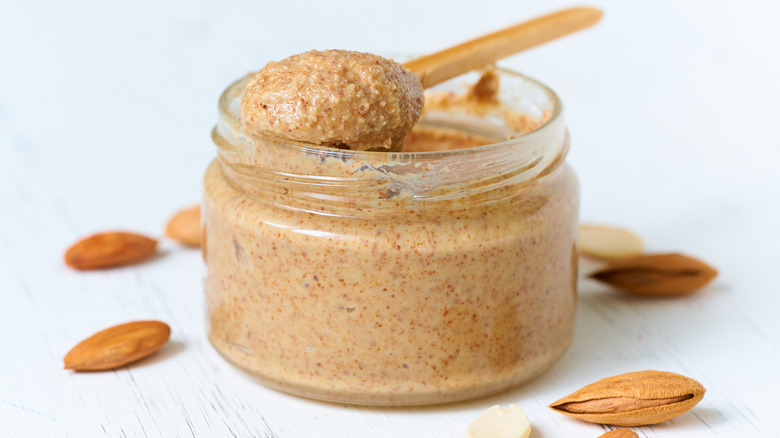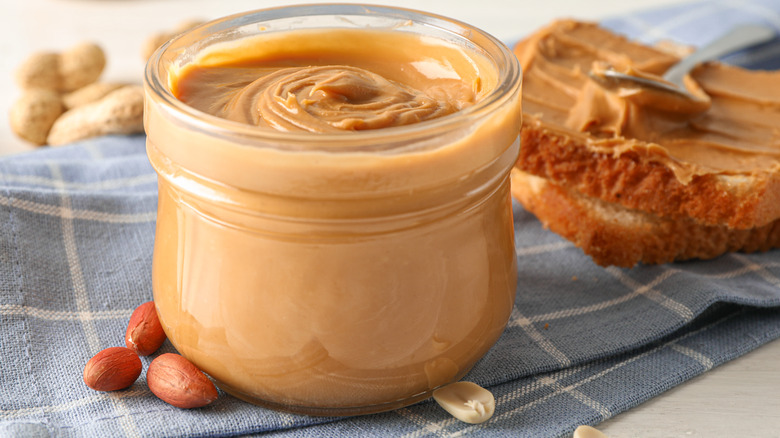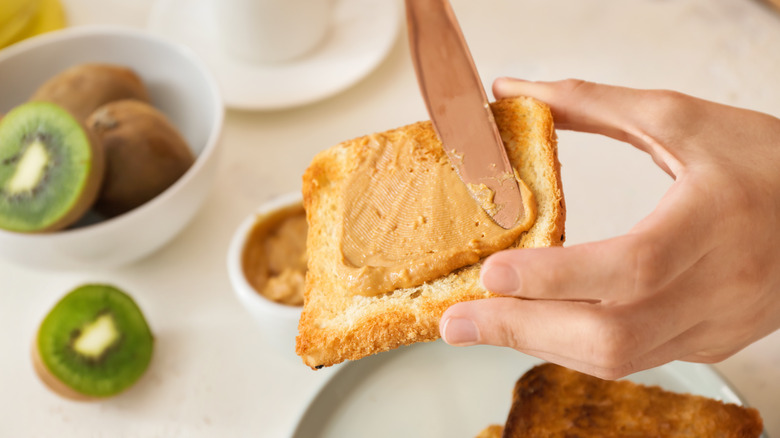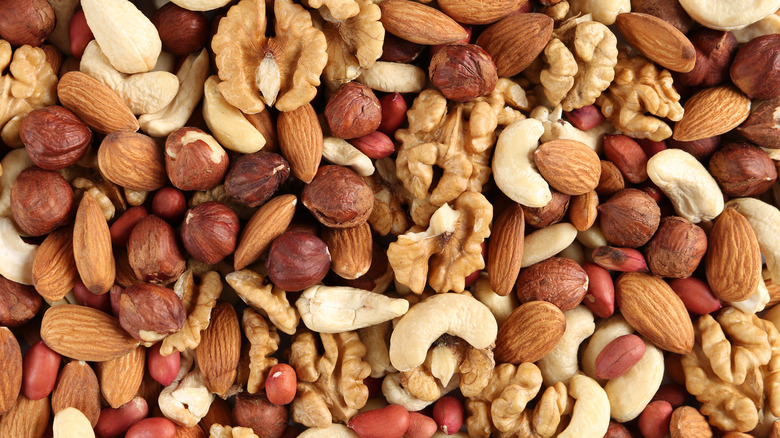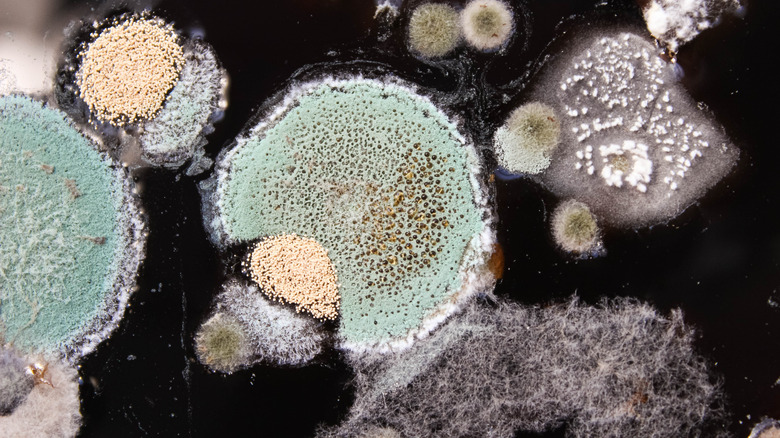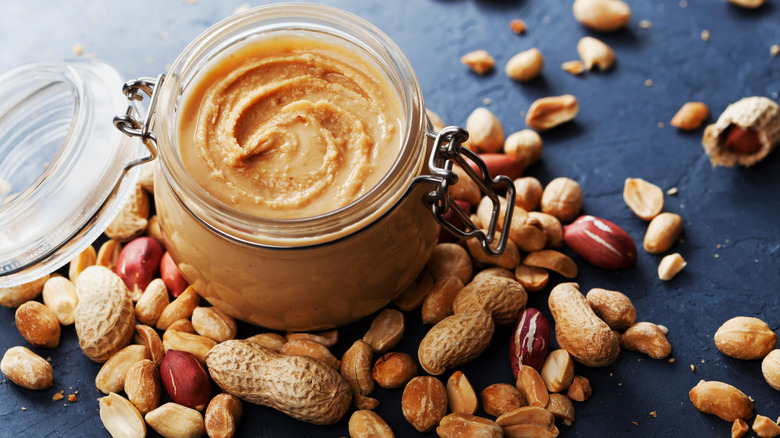Almond Butter Vs. Peanut Butter: Which Is Healthier?
The almond butter versus peanut butter debate has been around for years. While both foods have similar nutritional values, they're not one and the same. First of all, almonds are the seeds of drupes, explains the McGill Office for Science and Society. Peanuts, on the other hand, are classified as legumes, says Harvard Medical School. This aspect alone makes a difference when it comes to your health and nutrient intake. Both almond butter and peanut butter are chock-full of protein and healthy fats. Plus, they're low in carbs and rich in minerals. Almond butter is higher in certain vitamins and minerals but provides similar amounts of macronutrients as peanut butter.
The fact is that either nut butter can be more or less nutritious, depending on the ingredients used. Some brands are loaded with sugar, hydrogenated oil, and other fillers. Your best bet is to choose organic or natural nut butters with no sugar added. With that being said, why is peanut butter off-limits on the paleo diet and other healthy eating plans? And what's so special about almond butter? Here's how they compare.
Comparing nutrition facts for almond butter and peanut butter
Nut butters can make for a healthy snack between meals due to their high nutritional value. As with any food, always check the labels and watch your portions. Note that one serving of peanut butter is two tablespoons, according to the U.S. National Library of Medicine. The same goes for almond butter. Depending on the ingredients used, peanut butter has around 188 calories, 7 grams of protein, 16 grams of fat, and 7.7 grams of carbohydrates per serving, per My Food Data. High-sugar brands are typically higher in carbs. You'll also get nearly 2 grams of fiber and large doses of phosphorus, zinc, magnesium, copper, selenium, and vitamin E.
Almond butter, by comparison, has 196 calories, 6.7 grams of protein, 18 grams of fat, and 6 grams of carbs per serving, according to My Food Data. It also provides 3.3 grams of fiber — that's about 12 percent of the daily recommended intake. Compared to peanut butter, it's higher in calcium, phosphorus, magnesium, zinc, and other key nutrients.
Almond butter is more nutritious than peanut butter
Calorie for calorie, almond butter delivers more nutrients than peanut butter. For example, it has nine times more calcium, 5% more fiber, 7% more magnesium, and 11 percent more manganese per serving compared to the same amount of peanut butter, according to My Food Data. It's also higher in folate, vitamin E, and monounsaturated fats. Magnesium, one of the most abundant nutrients in almond butter, contributes to more than 300 biochemical reactions in the human body, per the U.S. Library of Medicine. When consumed in adequate amounts, it may protect against diabetes and cardiovascular problems. Almond butter is also an excellent source of phosphorus, a mineral that supports bone health and energy metabolism. Your body needs this nutrient to maintain its pH balance and activate certain enzymes, states the National Institutes of Health (NIH).
Peanut butter contains slightly more carbs and saturated fats than almond butter. However, it also boasts higher doses of selenium, niacin, choline, and omega-3s. Selenium, one of its key nutrients, is essential to DNA synthesis and the production of thyroid hormones, reports the NIH. This mineral also acts as an antioxidant, protecting against free radical damage. Choline, another essential nutrient in peanut butter, helps your body produce neurotransmitters that support memory, mood, and other brain functioning, according to the NIH. It's also required for fat metabolism and gene expression. The same source reports that about 90 to 95 percent of pregnant women are deficient in choline, which may lead to muscle and liver damage in the long run.
Almond and peanut butter contain different types of fatty acids
While both peanut butter and almond butter are rich in healthy fats, they contain different types of essential fatty acids. As registered dietician nutritionist Lauren Minchen told Women's Health, almond butter is higher in monounsaturated fatty acids (MUFAs) than peanut butter. The latter, on the other hand, is a better source of polyunsaturated fatty acids, or PUFAs. MUFAs may help reduce LDL cholesterol — the bad one — and increase HDL cholesterol — the good one — according to the University of Michigan. Plant-based MUFAs, such as those found in almond butter, appear to be particularly beneficial for heart health, per a 2018 study published in the American Journal of Clinical Nutrition. Diets rich in MUFAs may improve body composition, or fat-to-muscle ratio, and reduce body weight while decreasing blood sugar levels, according to a 2016 review featured in Diabetes Spectrum.
PUFAs have similar benefits on cardiovascular health and blood lipids. Adequate intakes of omega-3 and omega-6 fatty acids may lower bad cholesterol and triglycerides, reports Harvard Medical School. As the researchers note, omega-3s may reduce blood pressure, while omega-6s may protect against heart disease. Another difference lies in their contents of saturated fat. Peanut butter has more than double the saturated fat of almond butter, according to My Food Data. When consumed in excess, this nutrient can raise bad cholesterol and cause plaque buildup in the arteries, warns the American Heart Association. To stay safe, limit saturated fat to less than 5 to 6 percent of your daily calories.
Peanut butter may inhibit nutrient absorption
As mentioned earlier, peanuts are legumes. Like beans and peas, they contain lectins and phytates, especially phytic acid. These antinutrients can interfere with the absorption of iron, calcium, zinc, and other minerals, according to the Harvard School of Public Health. That's why peanut butter is off-limited for paleo dieters. However, it's not black and white when it comes to the antinutrients in food. As the Harvard School of Public Health notes, the human body may adapt to a diet high in antinutrients by absorbing more zinc, iron, and other minerals. Moreover, some antinutrients protect against oxidative stress and may benefit overall health due to their hypoglycemic and cholesterol-lowering effects.
Despite its high phytate content, peanut butter can fit into a balanced diet. Its potential health benefits outweigh the risks, says Minchen. As long as you're not allergic to peanuts, you can enjoy this treat every now and then. Like other protein-rich foods, it may increase satiety and speed up your metabolism. Dietary protein also helps preserve lean mass and may prevent metabolic slowdown while on a diet, according to a 2012 review published in the British Journal of Nutrition.
Peanuts and aflatoxin: What's the truth?
Peanut butter is also vilified for its potential to increase cancer risk. According to the National Cancer Institute, peanuts may contain aflatoxins, a class of compounds produced by Aspergillus flavus and other fungi. These toxins may raise the risk of liver cancer, organ damage, and birth defects, warns the World Health Organization. Even so, this doesn't mean you have to stop eating peanut butter. The experts at Berkley Wellness say that aflatoxins represent a health hazard in developing countries, but not in the United States. The peanuts sold in the United States are monitored by the USDA to ensure they are safe for consumption.
Furthermore, these toxins don't form in the peanut butter after packaging, as the National Peanut Board explains. As of today, there are no reported cases of aflatoxin contamination of peanut products in the U.S. However, if you're planning to order from abroad, then almond butter is probably a safer choice.
So, is almond or peanut butter healthier?
Now that you know more about how almond butter and peanut butter stack up, it's up to you to decide what to do next. Both nut butters are packed with protein, good fats, and other nutrients. They also have a similar caloric value and can fit into a healthy diet. Almond butter tends to cost more than peanut butter — that's something to consider if you eat these foods regularly. Whichever nut butter you prefer, making a habit out of reading the labels. Ideally, choose single-ingredient products and avoid those with palm oil, canola oil, added sugar, or flavorings. These extras can significantly boost the calorie count and cancel out any potential health benefits.
Think about your overall health, too. Both almonds and peanuts may cause allergic reactions. Non-profit organization Food Allergy Research and Education reports that more than six million Americans are allergic to peanuts. Nearly four million may be allergic to tree nuts, including almonds. If that's your case, consider using pumpkin seed butter, sesame butter, sunflower seed butter, and other alternatives.
